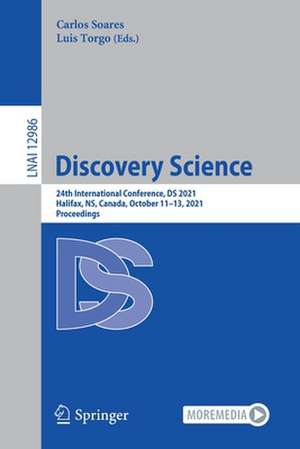Discovery Science: 24th International Conference, DS 2021, Halifax, NS, Canada, October 11–13, 2021, Proceedings: Lecture Notes in Computer Science, cartea 12986
Editat de Carlos Soares, Luis Torgoen Limba Engleză Paperback – 9 oct 2021
Din seria Lecture Notes in Computer Science
- 20%
 Preț: 1061.55 lei
Preț: 1061.55 lei - 20%
 Preț: 307.71 lei
Preț: 307.71 lei - 20%
 Preț: 438.69 lei
Preț: 438.69 lei - 20%
 Preț: 579.30 lei
Preț: 579.30 lei -
 Preț: 410.88 lei
Preț: 410.88 lei - 17%
 Preț: 427.22 lei
Preț: 427.22 lei - 20%
 Preț: 596.46 lei
Preț: 596.46 lei - 15%
 Preț: 448.04 lei
Preț: 448.04 lei - 20%
 Preț: 353.50 lei
Preț: 353.50 lei -
 Preț: 389.49 lei
Preț: 389.49 lei - 20%
 Preț: 309.90 lei
Preț: 309.90 lei - 20%
 Preț: 645.28 lei
Preț: 645.28 lei - 20%
 Preț: 763.23 lei
Preț: 763.23 lei - 15%
 Preț: 580.46 lei
Preț: 580.46 lei - 20%
 Preț: 310.28 lei
Preț: 310.28 lei - 20%
 Preț: 655.02 lei
Preț: 655.02 lei - 20%
 Preț: 1183.14 lei
Preț: 1183.14 lei - 20%
 Preț: 340.32 lei
Preț: 340.32 lei -
 Preț: 449.57 lei
Preț: 449.57 lei - 20%
 Preț: 591.51 lei
Preț: 591.51 lei - 18%
 Preț: 938.83 lei
Preț: 938.83 lei - 20%
 Preț: 337.00 lei
Preț: 337.00 lei - 20%
 Preț: 649.50 lei
Preț: 649.50 lei - 20%
 Preț: 607.40 lei
Preț: 607.40 lei - 20%
 Preț: 1414.79 lei
Preț: 1414.79 lei - 20%
 Preț: 1024.44 lei
Preț: 1024.44 lei - 20%
 Preț: 583.40 lei
Preț: 583.40 lei - 20%
 Preț: 453.32 lei
Preț: 453.32 lei - 20%
 Preț: 575.49 lei
Preț: 575.49 lei - 20%
 Preț: 1075.26 lei
Preț: 1075.26 lei - 20%
 Preț: 585.88 lei
Preț: 585.88 lei - 20%
 Preț: 825.93 lei
Preț: 825.93 lei - 17%
 Preț: 360.20 lei
Preț: 360.20 lei - 20%
 Preț: 763.23 lei
Preț: 763.23 lei - 20%
 Preț: 340.32 lei
Preț: 340.32 lei - 20%
 Preț: 504.58 lei
Preț: 504.58 lei - 20%
 Preț: 369.13 lei
Preț: 369.13 lei - 20%
 Preț: 580.93 lei
Preț: 580.93 lei - 20%
 Preț: 343.62 lei
Preț: 343.62 lei - 20%
 Preț: 350.21 lei
Preț: 350.21 lei - 20%
 Preț: 583.40 lei
Preț: 583.40 lei - 20%
 Preț: 583.40 lei
Preț: 583.40 lei - 15%
 Preț: 438.59 lei
Preț: 438.59 lei - 20%
 Preț: 341.95 lei
Preț: 341.95 lei - 20%
 Preț: 238.01 lei
Preț: 238.01 lei - 20%
 Preț: 538.30 lei
Preț: 538.30 lei
Preț: 541.02 lei
Preț vechi: 676.27 lei
-20% Nou
Puncte Express: 812
Preț estimativ în valută:
103.54€ • 107.70$ • 85.48£
103.54€ • 107.70$ • 85.48£
Carte tipărită la comandă
Livrare economică 14-28 aprilie
Preluare comenzi: 021 569.72.76
Specificații
ISBN-13: 9783030889418
ISBN-10: 3030889416
Pagini: 474
Ilustrații: XII, 474 p. 26 illus.
Dimensiuni: 155 x 235 mm
Greutate: 0.68 kg
Ediția:1st ed. 2021
Editura: Springer International Publishing
Colecția Springer
Seriile Lecture Notes in Computer Science, Lecture Notes in Artificial Intelligence
Locul publicării:Cham, Switzerland
ISBN-10: 3030889416
Pagini: 474
Ilustrații: XII, 474 p. 26 illus.
Dimensiuni: 155 x 235 mm
Greutate: 0.68 kg
Ediția:1st ed. 2021
Editura: Springer International Publishing
Colecția Springer
Seriile Lecture Notes in Computer Science, Lecture Notes in Artificial Intelligence
Locul publicării:Cham, Switzerland
Cuprins
Applications.- Automated Grading of Exam Responses: An Extensive Classification Benchmark.- Automatic human-like detection of code smells.- HTML-LSTM: Information Extraction from HTML Tables in Web Pages using Tree-Structured LSTM.- Predicting reach to find persuadable customers: improving uplift models for churn prevention.- Classification.- A Semi-Supervised Framework for Misinformation Detection.- An Analysis of Performance Metrics for Imbalanced Classification.- Combining Predictions under Uncertainty: The Case of Random Decision Trees.- Shapley-Value Data Valuation for Semi-Supervised Learning.- Data streams.- A Network Intrusion Detection System for Concept Drifting Network Traffic Data.- Incremental k-Nearest Neighbors Using Reservoir Sampling for Data Streams.- Statistical Analysis of Pairwise Connectivity.- Graph and Network Mining.- FHA: Fast Heuristic Attack against Graph Convolutional Networks.- Ranking Structured Objects with Graph Neural Networks.- Machine Learning for COVID-19.- Knowledge discovery of the delays experienced in reporting covid19 confirmed positive cases using time to event models.- Multi-Scale Sentiment Analysis of Location-Enriched COVID-19 Arabic Social Data.- Prioritization of COVID-19 literature via unsupervised keyphrase extraction and document representation learning.- Sentiment Nowcasting during the COVID-19 Pandemic.- Neural Networks and Deep Learning.- A Sentence-level Hierarchical BERT Model for Document Classification with Limited Labelled Data.- Calibrated Resampling for Imbalance and Long-Tails in Deep learning.- Consensus Based Vertically Partitioned Multi-Layer Perceptrons for Edge Computing.- Controlling BigGAN Image Generation with a Segmentation Network.- GANs for tabular healthcare data generation: a review on utility and privacy.- Preferences and Recommender Systems.- An Ensemble Hypergraph Learning framework for Recommendation.- KATRec: Knowledge Aware aTtentive Sequential Recommendations.- Representation Learning and Feature Selection.- Elliptical Ordinal Embedding.- Unsupervised Feature Ranking via Attribute Networks.- Responsible Artificial Intelligence.- Deriving a Single Interpretable Model by Merging Tree-based Classifiers.- Ensemble of Counterfactual Explainers. Riccardo Guidotti and Salvatore Ruggieri.- Learning Time Series Counterfactuals via Latent Space Representations.- Leveraging Grad-CAM to Improve the Accuracy of Network Intrusion Detection Systems.- Local Interpretable Classifier Explanations with Self-generated Semantic Features.- Privacy risk assessment of individual psychometric profiles.- The Case for Latent Variable vs Deep Learning Methods in Misinformation Detection: An Application to COVID-19.- Spatial, Temporal and Spatiotemporal Data.- Local Exceptionality Detection in Time Series Using Subgroup Discovery.- Neural Additive Vector Autoregression Models for Causal Discovery in Time Series.- Spatially-Aware Autoencoders for Detecting Contextual Anomalies in Geo-Distributed Data.
